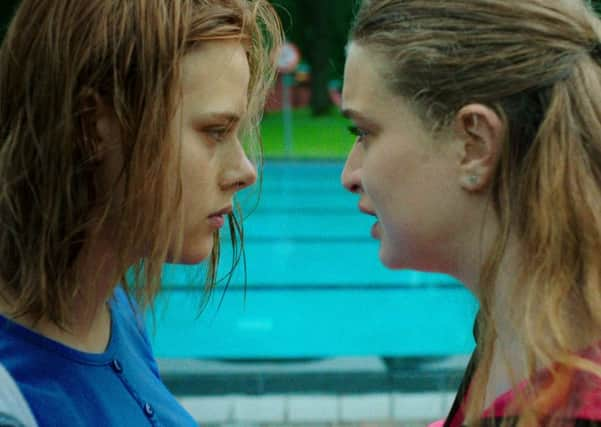Festival preview: The dramas and documentaries in the Scottish Mental Health Arts Festival film competition take a creative approach to complex issues


It’s a powerful scene because, like the rest of the film, its precise meaning is unclear. The subject of Horizon is a teenage girl’s struggle to control her rage – not a subject I’ve seen explored much on film before – but where this rage comes from is never fully explained. Is it a mental illness, or does she have good reason to be so angry? Or is it both? We know Lieke’s mum has recently died. It also seems as if something inappropriate has happened between her and the teacher, but we are never told what.
What the film does communicate, clearly and poignantly, is that mental ill health is complex. If that seems obvious, it’s not always evident in cinema. As a subject, mental health comes with a lot of traps – the temptation, for example, to show characters behaving irrationally, inexplicably, even dangerously, just because it’s dramatic. Lieke does all these things, at times, starting a fight in the schoolyard which the film strongly implies is not her first; Horizon succeeds, though, because she seems like a real, complex, sympathetic human being.
Advertisement
Hide AdThis year I was on the jury for SMHAF’s International Film Competition for the first time, watching more than 100 films from across the world; I had to spend a lot of time thinking about what a successful mental health film looked like. In some cases the decisions were easy – Crazy, another winner, is a respectful, balanced documentary about a schizophrenic man trying to exercise control over his treatment. Maybe It’s Me is a beautiful short film in which Dimitris Simou reconstructs memories of his grandfather in animated form, and in the process questions how reliable those memories are. I recommend both highly.
But then there are films like Laura’s Journey, which falls into various traps and yet, in its failures, creates something fascinating. It’s a documentary about a young woman who has lived with post-traumatic stress disorder ever since a horrific ordeal in Morocco, and who decides to return to all the places where it happened in an attempt to heal. As her friend, Matteo Born, films the journey, though, it soon becomes apparent that the needs of a film-maker aren’t always compatible with the needs of someone trying to recover from trauma, and things gradually fall apart; eventually Laura refuses to let Born film her at all. And yet there’s something about Born’s honesty and humility, and the way Laura’s Journey highlights the risks involved in filming people in such a vulnerable state, that convinced us we should still screen it.
This wasn’t always the case. One film I liked early on ingeniously edited together hundreds of hours of home movies made by a man with serious mental health problems, across decades of his life. The man was charismatic and fascinating and I became transfixed by this visual biography, until other jury members questioned (among other things) his capacity to consent to the material being used in this way. It was not, after all, his film.
Issues like these are, in part, why the most successful mental health films are often the ones in which the film’s subjects are clearly in control of their own stories. Sanctioned, showing alongside Laura’s Journey, is a simple but very effective short film about a woman for whom life modelling is a way to reclaim her body after a sexual assault. Throughout, we are invited to study her body up close, as if sketching her ourselves, but there is a clear sense that this is on her terms. Another film popular among the judges was But Honey You Look Fine, in which a teenager films her best friend as she talks – with the kind of frankness you only have with someone very close to you – about her struggle with bulimia.
That said, some of my favourite films this year were dramas. Horizon, certainly, is not to be missed. Other favourites included Being Keegan, in which actor Stephen Graham (of Boardwalk Empire and Band Of Brothers fame) plays a man returning to the scene of an awful, life-changing childhood accident in Liverpool. I also really liked Second Spring, a slow, understated but deeply poignant film about a woman, Kathy, who is behaving in an increasingly erratic way. One of the admirable things about Second Spring is its restraint. Countless films begin with a character behaving slightly strangely and then ramp this up to a climactic moment of “madness”. Kathy’s crisis is far less dramatic, involving a small act of well-intentioned, barely acknowledged theft, and most of her behaviour is relatable and endearing. When it is “explained” at the end by mental illness, it is almost a disappointment. As with Lieke in Horizon, it is Kathy’s complex humanity that makes her so appealing.
Of course, characters with mental health issues don’t need to be likeable, and often aren’t. Another film I enjoyed was Up & Down, which was a tricky proposition for a festival that aims to counter negative stereotypes around mental health, because it involves a mentally ill woman stabbing someone. No character, though, comes out of it looking especially admirable, and Up & Down has insight into the lengths families will go to when protecting their own. It also includes one of the loveliest dance sequences I’ve seen on film, a battle of wills between a bipolar woman and a group of boys noisily playing football outside her window. It’s not a scene with any positive, healing message, but it’s powerful and I’m very pleased it’s in the programme too.
SMHAF’s International Film Competition programme is at the CCA, Glasgow, 11-13 May. The International Film Awards are also at the CCA on Thursday. SMHAF runs until 27 May, www.mhfestival.com